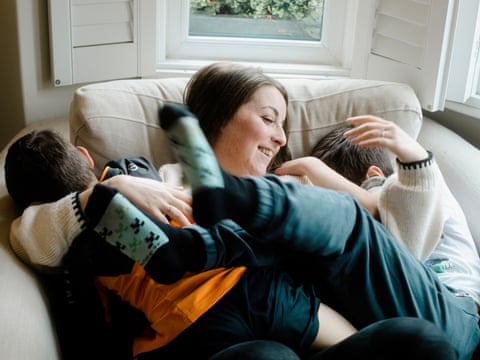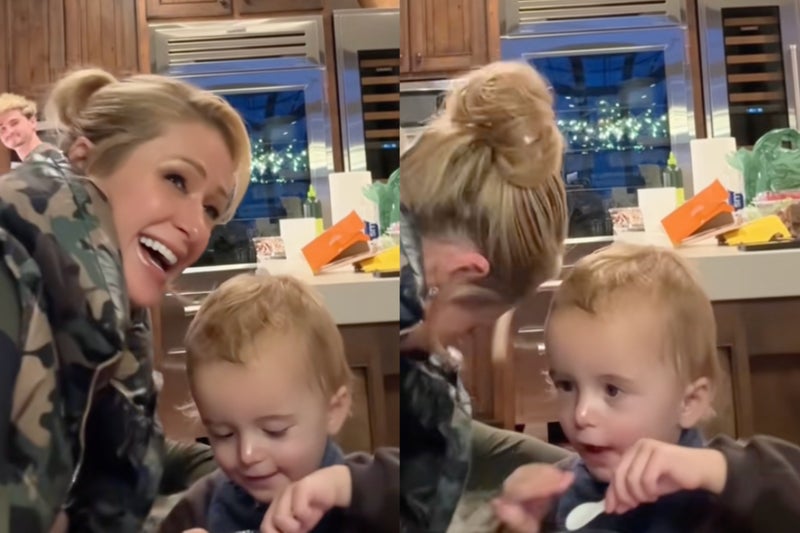A 'gentle parent' has revealed how she no longer forces her five-year-old to say sorry because it's 'disingenuous'. Kelly Medina Enos, 34, from North Yorkshire, turned to TikTok for parenting advice when her son George began hitting her at 18 months old. After connecting with other mothers, Kelly began looking more into gentle parenting - which focuses on having respect and empathy for children. Although she thought it was 'ridiculous' at first, the mother-of-two - who is now a certified gentle parenting coach - soon found it worked wonders in stopping George from climbing all over their home.
![[Kelly Medina Enos (pictured) turned to TikTok for parenting advice when her son George began hitting her at 18 months old]](https://i.dailymail.co.uk/1s/2025/02/10/10/95049573-0-image-a-24_1739184024638.jpg)
She explained: 'Climbing was a huge thing for me. George was climbing on everything. I was saying 'get down' but that didn't seem to land at all. 'I started saying "feet on the floor please". I was astonished at the difference by changing the way I was speaking to him instead of telling him what I don't want. 'I started to remove the word 'don't'. I still had discipline. I told him what I would like him to do.'.
![[Kelly has already started gentle parenting with Ariella (pictured) by teaching her baby sign language so she can communicate]](https://i.dailymail.co.uk/1s/2025/02/10/10/95049569-0-image-m-27_1739185047746.jpg)
As this worked so well, Kelly stopped forcing George to say sorry in situations - instead encouraging him to look at his behaviour himself. Pictured: Mother-of-two Kelly Medina Enos, 34, from North Yorkshire, with her children George, five, and Ariella, 14 months. She continued: 'A child doesn't develop empathy until they are around 11 years old. 'Expecting a child to have empathy is a learnt skill. If we say, "go and say sorry" - if say they snatched a toy - it's forced.
![[Through her gentle parenting coach training, Kelly (pictured with Ariella) learned how she had previously been echoing her family's approach when it came to raising George]](https://i.dailymail.co.uk/1s/2025/02/10/11/95049571-0-image-m-29_1739185422519.jpg)
'You find you haven't allowed child to step back. Instead say, "what's happened here?" "How do you think that person is feeling?" "What can we say?". 'Otherwise it's disingenuous. It's not that we don't want them to say sorry but there is a difference between telling them what to do. 'We still guide them through. We teach our children how to be better next time.'. However, Kelly says her son does 'hold empathy' and is 'incredible at communicating his feelings'.
She added: 'He can come home in huge frustration and I hold him and he crumbles. He'll say he's had a bad day and offloads.'. As such, Kelly has dropped things like 'time out' or the 'naughty step' and offers a 'calm down corner' instead. Kelly Medina Enos (pictured) turned to TikTok for parenting advice when her son George began hitting her at 18 months old. The mother-of-two said: 'With forced isolation the child often becomes more of a people pleaser or rebels.
'They learn they have no voice and their feelings don't matter. 'In time out a child is told to "sit and think about what you've done". The child is not thinking how they could have dealt with that better. 'They learn "I need to take away my feelings of frustration and anger and then I'm deemed lovable". 'We will stay away from forced isolation but we do a calm down corner which I offer to George. 'I'll ask him "would you like some time in the calm down corner?" It's got books and a breathe board - it's a non-sensory nook.
Kelly has already started gentle parenting with Ariella (pictured) by teaching her baby sign language so she can communicate. Through her gentle parenting coach training, Kelly learned how she had previously been echoing her family's approach when it came to raising George. However, she has taken a drastically different approach with her 14-month-old daughter Ariella. She continued: 'I really struggled because of the way I was raised - there was a lot of shouting.
'It was distilled in me. I shouted quite often. 'I worked out I was expecting quite a lot of George. I said out loud "why does he act like such a child?". 'He used to pull out all the baby wipes. I remember the frustration. 'With Ariella I just think "put them back".'. Through her gentle parenting coach training, Kelly (pictured with Ariella) learned how she had previously been echoing her family's approach when it came to raising George.
Kelly has already started gentle parenting with Ariella by teaching her baby sign language so she can communicate. She said: 'It's to alleviate that frustration. Ariella can communicate when she wants more food. 'After every single meal she'll ask for more. How would our relationship be if you don't know how to communicate if she wants more food?'. Although Kelly couldn't be happier with her new approach, the mother-of-two gets frustrated with the number of people who confuse gentle parentings with permissive parenting - where parents 'lack rules or structure, will not implement consequences, and tend to let their children run their household.
Admitting she's not a 'perfect parent', Kelly says she does place boundaries with her children. She said: "Nobody never shouts. No one gets it right all day everyday. 'Gentle parenting is when we seek connection even when correcting a child. 'We allow space for bigger emotions and give them root lessons without blaming and shaming. 'People say it's an easy way out - it's probably the hardest form of parenting.































